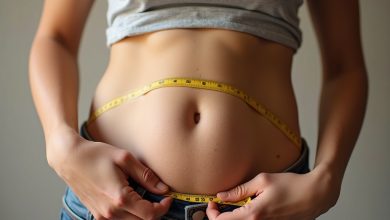
Alcohol Consumption and Belly Fat: What You Need to Know
Understanding the Connection Between Alcohol and Belly Fat
Many of us enjoy a drink now and then, whether it’s a glass of wine with dinner or a beer while watching the game. However, if you’ve noticed that your belly seems to be getting bigger, you might be wondering: does alcohol play a role in that? The answer is yes – alcohol consumption can significantly impact body composition, particularly belly fat.
What is Belly Fat?
Belly fat, or visceral fat, is the type of fat that accumulates around your abdomen and organs. While some fat is essential for health, excess belly fat is linked to various health risks, including diabetes, heart disease, and certain cancers. Understanding how lifestyle choices, including alcohol consumption, contribute to this type of fat can help us make better decisions for our health.
How Alcohol Affects Fat Storage
When you consume alcohol, your body prioritizes metabolizing it over other nutrients. This means that while your body is busy processing alcohol, it is less efficient at burning fat and carbohydrates. This metabolic shift can lead to increased fat storage, particularly in the abdominal area. Here are some key points to consider:
- Caloric Density: Alcohol is calorie-dense. For example, a standard beer can have around 150 calories, while a glass of wine can have 120 to 160 calories. These are calories that can contribute to weight gain if not accounted for in your daily intake.
- Increased Appetite: Drinking alcohol can stimulate your appetite, leading to overeating. You might find yourself snacking more when you drink, which can further contribute to weight gain.
- Hormonal Changes: Alcohol can affect hormones that regulate hunger and metabolism, making it easier to gain weight.
Types of Alcohol and Their Impact
Not all alcoholic beverages are created equal. The type of alcohol you consume can influence how much belly fat you gain:
- Beer: Often referred to as “liquid bread,” beer is one of the biggest culprits when it comes to belly fat. The carbohydrates in beer can contribute to weight gain, leading to what is commonly known as a “beer belly.”
- Wine: Moderate wine consumption, especially red wine, has been linked to some health benefits. However, excessive consumption can also lead to weight gain, particularly if paired with high-calorie foods.
- Spirits: Cocktails and mixed drinks can be particularly dangerous due to added sugars and mixers. These drinks can pack a caloric punch and contribute significantly to weight gain.
Strategies to Reduce Belly Fat While Enjoying Alcohol
If you enjoy drinking but are concerned about belly fat, there are ways to strike a balance. Here are some strategies:
- Moderation is Key: Limit your alcohol intake to moderate levels. The CDC recommends no more than one drink per day for women and two for men.
- Choose Wisely: Opt for lower-calorie drinks. Light beers, dry wines, and spirits mixed with soda water or diet mixers can be better choices.
- Stay Hydrated: Drink water between alcoholic beverages. This can help you stay hydrated and reduce overall alcohol consumption.
- Mind Your Snacks: Be mindful of what you eat while drinking. Avoid high-calorie snacks and opt for healthier options like vegetables and hummus.
Conclusion: Making Informed Choices
In conclusion, while alcohol can be enjoyed in moderation, it’s essential to understand how it can contribute to belly fat and overall weight gain. By being mindful of your consumption and making informed choices, you can enjoy your favorite beverages without compromising your health goals. Remember, balance is the key to a healthy lifestyle!




